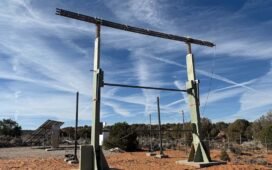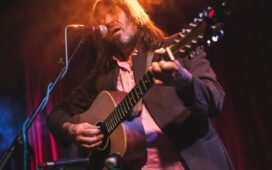“We are going to burn you alive!”
Sherly Norzéus, together with her three children and the two children of her sister who died in childbirth, was trapped, her car surrounded by 20 armed thugs—part of a gang that terrorized her neighborhood since before dawn, setting fire to homes and randomly shooting people.
Norzéus responded by shutting her eyes and praying fervently to Papa Ogou, the Vodou god of war and iron, to spare her and the children. When she opened her eyes, the family’s would-be assailants were gone.
Haiti has gone mad. In recent years, the country has exploded with gang violence, leaving nearly 400,000 homeless, shutting down the country’s main international airport and rendering Port-au-Prince, its biggest seaport and commercial hub, useless. The door has been shut to receiving the basics of life—food, medicine and other goods. Nearly 2 million of Haiti’s 11.5 million inhabitants are on the verge of famine. In the first three months of this year, more than 2,500 Haitians were killed or injured, a figure up by over 50 percent as the same period last year, according to U.N. statistics.
Amid privation and chaos, people turn to religion. In Haiti, as the nation heaves and spirals into horror after horror, more Haitians are doing likewise, the religion of choice being the once-shunned faith of Vodou (more familiarly and incorrectly known as “Voodoo”).
Sherly Norzéus is a “mambo,” or Vodou priestess. “The spirits help you. They’re always around,” she says. Of the incident at her car, she said, “I prayed to Papa Ogou. He helped me get out of the situation.”
Vodou, an amalgam of Catholicism and animism, was an export from West Africa brought to the New World by enslaved people. It played a crucial part in the revolution that made Haiti the planet’s first free black republic generations before Lincoln freed the slaves in the neighboring nation to the north. It has continued to form the bass line to the melody that has been Haitian history to the present day.
Though an intrinsic part of the culture, the religion has been oppressed for over two centuries, first at the moment of independence when the country’s new leaders, along with the Catholic Church, condemned the worship of vodou spirits, and then in 1941 when Catholic parishioners were compelled to take an oath renouncing Vodou. During that period, thousands of its followers were lynched and hundreds of sacred spaces destroyed—yet the religion and its practice continued.
In 1957, incoming president François Duvalier appointed several oungans—male Vodou priests—to represent the religion, thus politicizing the faith. In 2003, Jean-Bertrand Aristide, a Catholic priest who became Haiti’s first democratically elected president, recognized Vodou as one of Haiti’s official religions.
Cecil Elien Isac, a 4th-generation oungan, commented on the resurgence of Vodou in the wake of gang violence and government inertia. “Whenever the community has a big problem, they come here, because there is no justice in Haiti,” he said. “You find it in the ancestral spirits.”
Isac’s flock in Port-au-Prince began with about eight families. It has since swelled to over 4,000 in Haiti and abroad.
“We have a group of intellectuals who have joined,” he said. “Before, it was people who couldn’t read or write. Now, it has more visibility.”
A civil engineer, Kadel Bazile, was once a practicing Catholic but turned to Vodou after his wife left him and he lost his job, both within one year. “What I find here is spirituality and fraternity. Being here is like being with family,” he said while attending a spring ceremony of dance and drums honoring Kouzen Zaka, the lwa (god) of harvest.
Bazile’s favorite, however, is Erzulie Dantor, the divinity of love whose image is a Black Madonna with scars on her right cheek.
“That is the spirit who lives in me,” he said. “She is going to protect me.”
Vodou has never been absent from the small nation, infusing itself into the culture—its music, art, writing and dance. It was there long ago for the slaves as they plotted a revolution in secret by the light of the moon, and it persists—like the Haitians themselves, enduring slavery, poverty and violence—a symbol of the resistance and unkillability of its people.
Photo credits: Oungan performing a ritual at a Vodou ceremony by Anthony Karen, CC BY 4.0.








Recent Comments